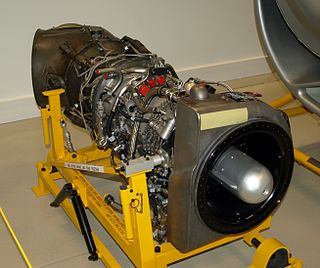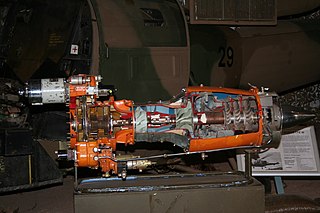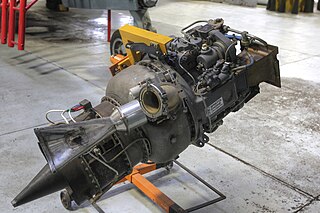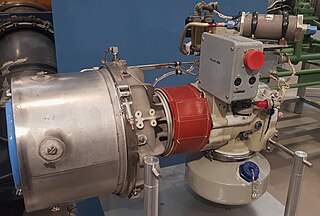The Soloviev D-25V is a Soviet gas-turbine turboshaft engine for use in large helicopters. Designed and originally manufactured by the Soloviev Design Bureau the engine has been in production since May 1960. The power unit consists of two engines coupled to a gearbox weighing 3,200 kg (7,050 lb).

The Napier Gazelle is a turboshaft helicopter engine that was manufactured by D. Napier & Son in the mid-1950s. In 1961 production was nominally transferred to a joint venture with Rolls-Royce called Napier Aero Engines Limited. But the venture closed two years later.
The JSC Klimov presently manufactures internationally certified gas turbine engines, main gearboxes and accessory drive gearboxes for transport aircraft.

The Rolls-Royce Gnome is a British turboshaft engine originally developed by the de Havilland Engine Company as a licence-built General Electric T58, an American mid-1950s design. The Gnome came to Rolls-Royce after their takeover of Bristol Siddeley in 1968, Bristol having absorbed de Havilland Engines Limited in 1961.

The Turbomeca Astazou is a highly successful series of turboprop and turboshaft engines, first run in 1957. The original version weighed 110 kg (243 lb) and developed 240 kW (320 shp) at 40,000 rpm. It was admitted for aviation service on May 29, 1961, after a 150-hour test run. The main developing engineer was G. Sporer. It was named after two summits of the Pyrenees.

The Turbomeca Artouste is an early French turboshaft engine, first run in 1947. Originally conceived as an auxiliary power unit (APU), it was soon adapted to aircraft propulsion, and found a niche as a powerplant for turboshaft-driven helicopters in the 1950s. Artoustes were licence-built by Bristol Siddeley in the UK, Hindustan Aeronautics Limited in India, and developed by Continental CAE in the US as the Continental T51. Two major versions of the Artouste were produced. The Artouste II family, mainly used in the Aérospatiale Alouette II helicopter, had a one-stage centrifugal compressor and a two-stage turbine, with gearbox-limited power of 300 kW (400 hp). The Artouste III family, mainly used in Aérospatiale's Alouette III and Lama helicopters, had a two-stage axial-centrifugal compressor and a three-stage turbine, with gearbox-limited power of 420–440 kW (560–590 hp).

The Turbomeca Turmo is a family of French turboshaft engines manufacturered for helicopter use. Developed from the earlier Turbomeca Artouste, later versions delivered up to 1,300 kW (1,700 shp). A turboprop version was developed for use with the Bréguet 941 transport aircraft.

The Pratt & Whitney T73 is a turboshaft engine. Based on the JT12A, the T73 powered the Sikorsky CH-54 Tarhe and its civil counterpart Sikorsky S-64 Skycrane flying crane heavy-lift helicopters. Turboshaft versions for naval use are known as the FT12.

The Pratt & Whitney Canada PT6T Twin-Pac is a turboshaft engine designed for helicopters. Manufactured by Pratt & Whitney Canada, its first application was in the Bell 212 and UH-1N Twin Huey helicopter family. The PT6T Twin-Pac consists of two PT6A power turbines driving a common output reduction gearbox, producing up to 2,000 hp at 6,000 rpm. The engine is designated T400 by the U.S. military.

The Boeing T50 was a small turboshaft engine produced by Boeing. It was the first turboshaft engine to ever power a helicopter: a modified Kaman K-225 in 1951. Based on Boeing's earlier Model 500 gas generator, the T50's main application was in the QH-50 DASH helicopter drone of the 1950s. An up-rated version designated Model 550 was developed to power the QH-50D and was given the military designation T50-BO-12.
The Boeing T60 was a family of small turboshaft/turboprop engines produced by Boeing, based on Boeing's earlier Model 500 gas generator and Model 502 (T50) turboshaft engines.

The Turbomeca Palouste is a French gas turbine engine, first run in 1952. Designed purely as a compressed air generator, the Palouste was mainly used as a ground-based aircraft engine starter unit. Other uses included rotor tip propulsion for helicopters.

The Klimov TV3-117 is a Soviet gas turbine aero engine. It is used in most medium lift, utility, and attack helicopters designed by the Mil and Kamov design bureaus. The TV3-117 turboshaft engine was developed in 1974. Later the Klimov TV3-117 was installed on 95% of all helicopters designed by Mil and Kamov Engineering Centre. The engine has been produced in many variants.

The Solar T62 Titan is an American gas turbine engine used mainly as a helicopter auxiliary power unit (APU), ground power generator, turboprop engine or helicopter turboshaft engine. A free power turbine version was developed as the Solar T66.

The Klimov TV7-117 is a Russian turboprop engine certified in 1997 to power the Ilyushin Il-114 regional commuter aircraft. The new engine features enhanced reliability, fuel economy and greater service life compared to its predecessors produced in the former Soviet Union. The engine has a modular design. The nine modules can be replaced in the field, which dramatically reduces costs and accelerates repair and maintenance. The engine has an electronic-hydromechanical control system.

The Klimov VK-2500 is a Russian turboshaft aero engine, a high power derivative of the TV3-117VMA engine, also for hot and high.

The Klimov GTD-350 is a Soviet gas-turbine turboshaft engine intended for helicopter use. Designed in the early 1960s by the Isotov Design Bureau the engine was later produced by Klimov and PZL, production ending in the late 1990s.

The Ivchenko AI-24 turboprop aircraft engine was designed and developed in the late-1950s by the Ivchenko design bureau and manufactured thereafter by Motor Sich. It was designed to power Antonov's successful An-24, An-26 and An-30 aircraft series.

The MAN Turbo 6022 is a German gas turbine turboshaft engine for helicopter use. Designed in the early 1960s by BMW the engine powered the third prototype of the MBB Bo 105 on its maiden flight in December 1967.

The Lotarev D-136 is a turboshaft engine from the ZMKB Progress Design Bureau. The engine powers the Mil Mi-26 "Halo" helicopter. Development of the engine had begun in about 1972.. The D-136 first flew on a production Mi-26 helicopter in 1980.

















